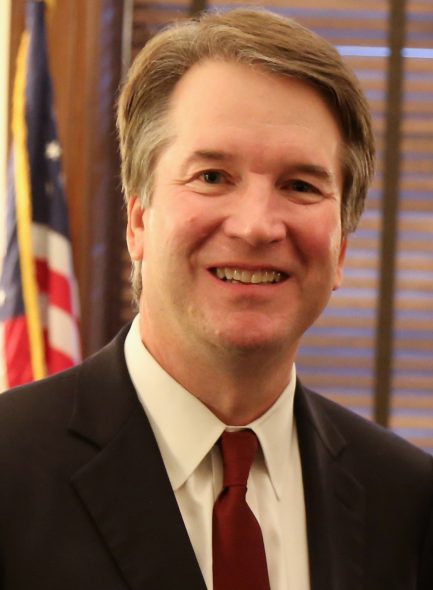Kavanaugh Opinion on State’s Election Called “Ominous”
Supreme Court justice echoes Trump’s view that election day must decide final vote.
On Monday evening, just minutes before President Donald Trump held a Rose Garden ceremony to swear in Supreme Court Justice Amy Coney Barrett, the Court rejected an appeal to extend the deadline for counting mail-in ballots in Wisconsin.
Ballots that are mailed before Election Day but arrive after Nov. 3 will not count, under the conservative majority’s 5-3 ruling. That’s a reversal from April, when the Court allowed election officials to count 79,054 ballots — or about 7% of all absentee ballots cast — that were postmarked by Election Day on April 7 but received between April 7 and the Court-extended deadline of April 13.
“People who follow the law to the letter will be disenfranchised. And neither the Seventh Circuit nor SCOTUS sees any problem at all,” Jeff Mandell, one of the attorneys who brought the appeal, stated.
“This happened to thousands of voters in Wisconsin in April, which is why we asked a federal district court to extend the ballot receipt deadline from Nov. 3 to Nov. 9,” concurred attorney Douglas Poland, Mandell’s partner. “The district court agreed after an evidentiary hearing, but SCOTUS took it away.”
Voting-rights advocates called the decision “ominous,” especially a concurring opinion by Justice Brett Kavanaugh citing Bush v. Gore, the decision in which the Court shut down the vote count in Florida during the 2000 election, effectively handing the presidency to George W. Bush.
Echoing Trump, who has repeatedly stated that the election must be resolved on Election Day (although Wisconsin, among other states, never certifies official results on Election Day) Kavanaugh defended the disqualification of absentee ballots that are mailed according to the rules by claiming that “most states” want a quick resolution to the election: “Those States want to avoid the chaos and suspicions of impropriety that can ensue if thousands of absentee ballots flow in after election day and potentially flip the results of an election,” Kavanaugh wrote. “And those States also want to be able to definitively announce the results of the election on election night, or as soon as possible thereafter.”
The Wisconsin Elections Commission noted in a report on the April 7 election that absentee voting has reached unprecedented levels in 2020 during the pandemic: “At a local level, the extraordinary volume placed enormous stress on election officials, elections systems, and the United States Postal Service.”
In April, accommodating the difficulty in managing all of those ballots required extra time.
Kavanaugh defends the power of state legislatures to set election rules against federal district courts that “swoop in and alter carefully considered and democratically enacted state election rules when an election is imminent.”
Only three justices joined that opinion, which gives the Supreme Court extraordinary power over elections.
“The confirmation of Amy Coney Barrett almost exactly coinciding with a Supreme Court decision that failed to side with expanding voting rights,” Democratic Party chair Ben Wikler tweeted, “is a perfect encapsulation of the GOP’s view of the courts: as a weapon against democracy.”
Wisconsin voters can request an absentee ballot until October 29, 2020. Ballots must be received at election offices, not just postmarked, by Election Day in order to be counted. Voting-rights groups are encouraging voters to return completed absentee ballots to municipal clerks’ offices in person and at their polling place using the curbside voting option. For more information on voting in the Nov. 3 election, go to VOTE411.org.
Reprinted with permission of Wisconsin Examiner.
More about the 2020 General Election
- Senator Agard Statement on Senator Knodl’s Continued Relitigation of the 2020 Presidential Election - Dane County Executive Melissa Agard - Aug 29th, 2023
- Report Calls For Criminally Charging State’s Fake Electors - Henry Redman - Dec 19th, 2022
- Vos Withdraws Subpoenas, Ends Gableman Probe - Henry Redman - Aug 30th, 2022
- Judge Blasts Gableman Probe, Deleted Records - Henry Redman - Aug 17th, 2022
- Vos Fires Gableman, Ends Election Probe - Shawn Johnson - Aug 14th, 2022
- Judge Orders Gableman To Pay $163,000 In Legal Fees - Rich Kremer - Aug 2nd, 2022
- Prosecute 2020 Fake Electors, Advocates Demand - Erik Gunn - Aug 1st, 2022
- Trump Calls For Nullification of Wisconsin’s 2020 Election - Henry Redman - Jul 12th, 2022
- Legal Fight Over Gableman Probe Keeps Growing - Shawn Johnson - Jun 30th, 2022
- Back In the News: Fake Elector Scheme Dogs Ron Johnson - Bruce Murphy - Jun 28th, 2022
Read more about 2020 General Election here






















